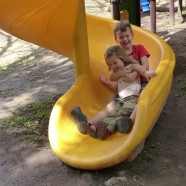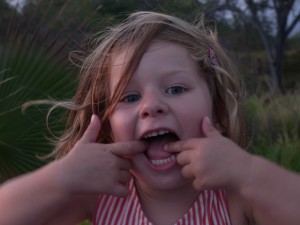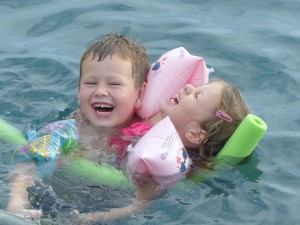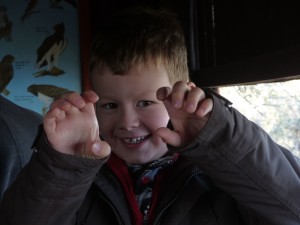
This week we have tried to capture some of our learnings in useful posts for other aspiring travelers. We will post three new ‘Resources’ post. The first one today is about how to keep the kids happy during traveling. The second one, tomorrow, will be about budget and the third one, Saturday, will be about all the handy and useful things we took with us.
=======================================================
One of our big concerns we had for this trip was about the kids. How do we provide a situation for them in which they are content and experiencing emotional well being?
When the idea of this trip occurred to us I thought we were absolutely crazy taking our kids out of their stable life and into this whirl wind of impressions and experiences. And then the idea settled in and I started visioning how this could actually work for them and be an addition to their life, something that they take with them as a loving cell memory of inspired family time that will never be lost – whether they will remember it consciously or not. So we came up with some rules of thumb that we thought would be helpful to bring stability and some rituals that would assist them in feeling loved and at home. They worked. Our kids have had a wonderful journey, they have loved it (maybe even more then we did). And although they do miss interaction with a group of kids, like in school, they do not necessarily desire to go back home. They have asked us if we can’t go and live on Hawaii? (yes dear, we would love to… but just not quite yet…) They did feel homesick on a few occasions, not often, and sometimes they felt homesick not to the house we have in The Netherlands, but more to the animals they have come to love along the way, or the places that really went deep into their hearts. We learned to acknowledge it, feel it and be with it, and let it pass through us as quickly as it came. I thought it might interest those of you who might want to undertake something like we did, so I decided to share some of what we did here. It’s not rocket science, but these simple things really worked very well for our kids, and for us.
Just like kids need holidays breaks from school kids need breaks from new impressions. They need time to just ‘be’, without ‘having to’ do anything. So we planned for resting time every time when we arrived in a new country and every time when we would leave a country. That means you have two resting times very close together, but as long haul flights are very intense they really need it, and they require time to process the changes and impressions. We also planned for a resting week every few weeks where we would do nothing special. We would play, swim, sleep, watch movies and that sort of things, but we wouldn’t go see new things.
We also tried to stay regularly at accommodations for at least 7 and up to 14 days. This way the kids would know their way around and have a feeling of ‘home’ in the places we were staying. We would explore the neighbouring area the slow way. With the campervan we were traveling every one to two days, but the campervan itself brought the stability we were looking for, they slept in the same bed in their own ‘room’ every night and they knew their way around the van. The last leg of our trip we had 4 weeks that we deviated from the stay at least for 7 days rule, we stayed in accommodation for 2-4 days and then continued our route. We found that it was too intense for the kids. They got very tired and weepy, it really didn’t work very well, even though we did things that they liked.
Food is very much related to emotions and feelings, so another thing we tried to do was being consistent with meals. The kids had their own familiar things, like their own placemat and their own cup and our 2 year old has her own cutlery. We tried to keep to the same rhythm as we did at home, with meal time and snack time. And we tried to give them the same kind of things, to put food on the table that we used to eat at home and snacks that were in the same range of what they were used to. Carrots and bananas do taste differently on every continent and that was change enough for our 2 little ones!
After lunch we rest on days we spend at ‘home’. Our 4 year old will listen to an audio book in a quiet space and our 2 year old will be in her room with the curtains closed, playing with her cuddly toys or sleeping, depending on how tired she is. We really value this time. We notice that they are much more content when they have this ‘down time’ with less impulses. I guess this works for them like meditating works for us. We have come to make a habit of meditating on a daily basis, and it really works for us.
Throughout the day we make space for familiar things, like time to play with their own toys or time to watch dutch kids movies they know from home. We also wrote a dairy for them in which they can express themselves, and tell what they did liked or didn’t like, re-telling their adventures and stories. In the beginning we did write every day, but as time went by we found that it worked better when we wrote every few days. Every day was too much for them. We also made time for arts and craft and for physical exercise, because we know that kids need those to bring out what’s inside. This means that we always carry around things like coloured paper, glue and scissors. We also have a sequence of toddlers dance lessons on the Ipad that I would dance with them, sometimes even at the airport in-between flights or when we would have to wait for a long time. The kids would also join me at times when I do yoga, or we would play soccer or go to the playground. We also invite them to have regular contact with the grandparents, aunties and their big niece they love a lot, so we send them postcards and Skype with them when they ask for it (and more often when we think they do not ask for it often enough ;). Lots of familiar things on our journey, but of course kids also need to be challenged to be happy, so we involved them in things that would stretch them a little, especially our 4 year old. We mostly did that through involving them in learning about the place where we were, through learning them new skills like snorkelling and through homeschooling.
Our bedtime routine is the most important time of day I feel. We really take time for that. We read to them, sing to them, take time to lay in bed with them and chat about the day or about how they feel and of course cuddles and kisses. If we rush this we have noticed they will be restless. No matter how tired we are and how intense the day has been, they require to be held and loved, and bedtime naturally provides that special intimate space and time in which the kids can relax and receive.




